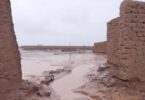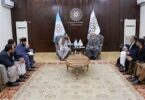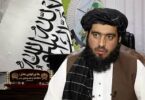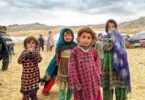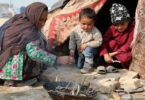KABUL (Pajhwok): Last week, a number of countries once again underlined the need for an inclusive government in Afghanistan.
Additionally, the Organisation of Islamic Countries (OIC) opened an office in Kabul and fresh global aid worth €79 million was pledged to Afghanistan.
Causalities
Last week, at least 26 people were killed and nine others wounded in different incidents in the country.
Ten Daesh — Islamic State — rebels were killed in Kabul and Herat, according to local officials.
Meanwhile, a groom and his bride were killed in the Alishang district of Laghman province. The killer was detained, officials said.
One person was killed and another injured due to a clash between two rival families in the Alingar district of eastern Laghman on Friday.
A six-year-old child shot herself dead while playing with a gun in northern Faryab province.
The bodies of a woman and a man were found in Paktia and Logar provinces. In Kapisa, a man killed his wife and unidentified gunmen shot dead two people, including a prayer leader, in Kabul.
Separately, five people were injured as a result of an explosion in Balkh, while three children lost their lives in a mortar shell blast in Farah.
Reports say a gunman opened fire at two people, killing one and injuring the second. In Faryab, a man killed his father and uncle. One person was killed and two others were wounded in a clash between rival families in Nangarhar.
These casualty figures are based on reports reaching Pajhwok. Some incidents may have gone unreported and sources could have provided incorrect numbers.
In the previous week, seven people had been killed and three others injured in various incidents of violence across the country.
Before the regime change last year, hundreds of civilians and people associated with the warring parties would be killed and injured every week.
Moscow meeting
Representatives from China, Tajikistan, Uzbekistan, Turkmenistan, Iran, Pakistan, India, Kyrgyzstan, Kazakhstan and Russia attended the meeting. Representatives from Turkey, Qatar, the UAE and Saudi Arabia were also present as observers.
Representatives of the caretaker government were not invited to the meeting.
The Moscow meeting emphasised on the formation of an inclusive government in Afghanistan and concrete actions to expel terrorist groups.
President Putin’s Special Representative for Afghanistan Zamir Kabulov said the participants unanimously backed the creation of a broad-based government in Afghanistan.
“We all see the situation in Afghanistan the same way, and we all unequivocally support the formation of an ethno-politically inclusive government in that country as soon as possible,” Kabulov added.
For its part, the interim government of Afghanistan insisted no country faced any threat from Afghanistan and welcomed positive regional mechanisms. The IEA promised it would not allow any country to build military facilities on the territory of Afghanistan.
The Taliban administration said the Moscow meeting’s emphasis on a peaceful, united, independent and economically developed Afghanistan was a commendable move.
Calls for inclusive govt
On the sidelines of the Moscow meeting, representatives from Iran, India and Russia held a special gathering on Afghanistan. They stressed the need for stability, security and an inclusive government in Afghanistan.
Markus Potzel, the UN chief’s deputy special representative for Afghanistan, met civil society representatives and authorities of Faryab province in Maimana. He said a peaceful and stable Afghanistan required inclusive political processes to respect the rights of all Afghans.
In a recent statement, the US State Department said Washington’s “commitment to the people of Afghanistan is enduring”.
It added: “We will continue to press for an orderly transition of power to an inclusive government with broad support, especially women and minorities.”
But Zabihullah Mujahid, spokesman for the government, said: “The IEA pays attention to inclusion and other issues. This is a family issue for Afghans. Foreign pressures or orders are not reasonable. The government has repeatedly said that other countries should not interfere in Afghanistan’s internal affairs.”
Pakistan Foreign Minister Bilawal Bhutto Zardari asked the Taliban to respect human rights, particularly girls’ right to education.
Addressing a news conference in Islamabad on Friday, he urged the new Afghan administration to prevent terrorist groups from operating on its soil.
The international community’s patience with the Taliban government was running thin, he warned. “But still, we advocate for engagement with Afghanistan …”
Women’s rights
Last week, the caretaker government declared gyms and public baths off-limits for women. The restriction came days after the IEA banned women from parks and funfairs. The bans drew sharp reactions from international institutions.
The United Nations and the European Union expressed their concern and condemned the new restrictions on women by the caretaker government of Afghanistan.
The UN Assistance Mission in Afghanistan (UNAMA) tweeted that it was deeply concerned at recent Taliban statements and mounting on-the-ground reports of women being prevented from using parks, gyms and baths.
Akif Muhajir, spokesperson for the Ministry of Vice and Virtue, said they had tried their best during the past 15 months not to close parks and gyms for women, but people did not care about the orders issued for separation of women and men. Women also did not comply with the hijab order, he claimed.
OIC opens office in Kabul
In a move that may further cement ties between Afghanistan and the Muslim world, the OIC opened an office in Kabul.
OIC secretary general’s special envoy for Afghanistan Tariq Ali Bakheet opined the mission would play a key role in the delivery of humanitarian and development aid to the country.
Bakheet called for the international community, especially Islamic countries, to step up support for Afghanistan in dealing with the current humanitarian situation.
The OIC mission would help spur improvement in Afghanistan’s relations with other Islamic countries, Minister of Foreign Affairs, Amir Khan Muttaqi, hoped.
Addressing the opening ceremony here, the foreign minister believed the OIC office would boost political cooperation and humanitarian support for the country.
Continuation of humanitarian aid
The European Union pledged a €210 million aid package for 15 countries at the G20 summit in Bali, Indonesia, with €75 million to be spent in Afghanistan.
The G20, which includes countries ranging from the United States, Russia and Brazil to India, Saudi Arabia and Germany, accounts for more than 80 percent of the world’s gross domestic product, 75 percent of international trade and 60 percent of its population.
Last week, two packages of international humanitarian aid amounting to $40 million arrived in Kabul. Reports say Afghanistan received about one and half billion US dollars in aid during the past one year.
Also, the World Food Program (WFP) stored 72,000 tonnes of food items for the coming winter in remote areas of Afghanistan for use them in case of road closures.
Meetings
Chinese ambassador in Kabul Wang Yu said his country would continue to support the caretaker government of Afghanistan as, it considered relations between the two countries important.
Wang Yu said this during a meeting with acting Foreign Minister Maulvi Amir Khan Muttaqi in Kabul, wrote Hafiz Zia Ahmad, deputy spokesman for the Ministry of Foreign Affairs.
Former president Hamid Karzai, during a meeting with Deputy Secretary General of OIC Tariq Ali Bakheet, called national dialogue among Afghans necessary and stressed the need for its early commencement.
Acting Interior Minister Sirajuddin Haqqani, emphasising on impartial coverage of events by international media, asked global news outlets not to politicise non-political issues in Afghanistan.
Haqqani expressed this view during a meeting with BBC South Asia Correspondent Jackie Martinez.

